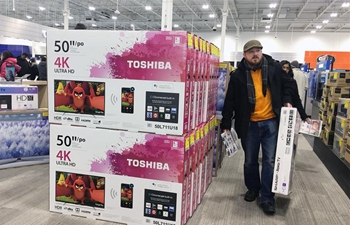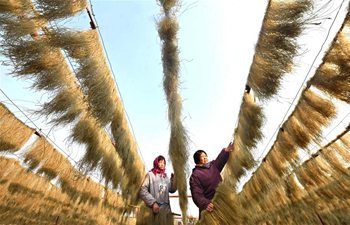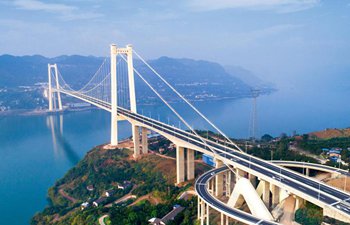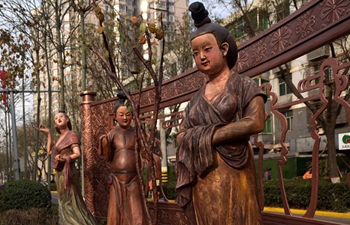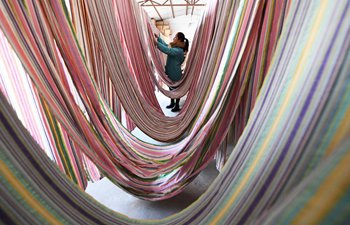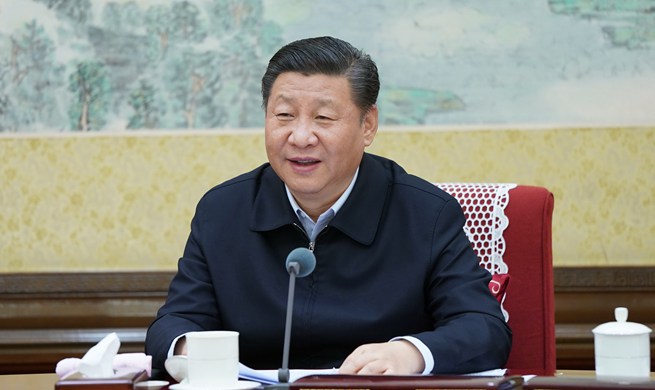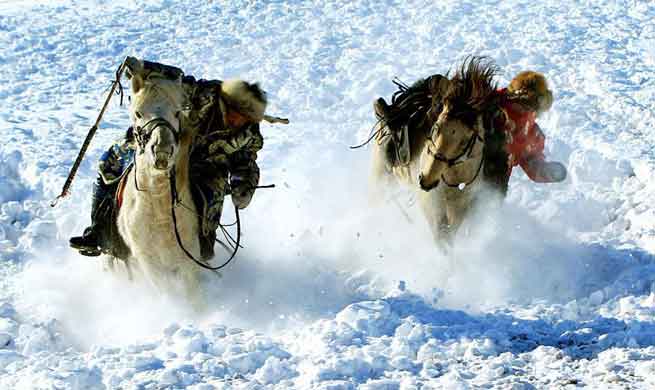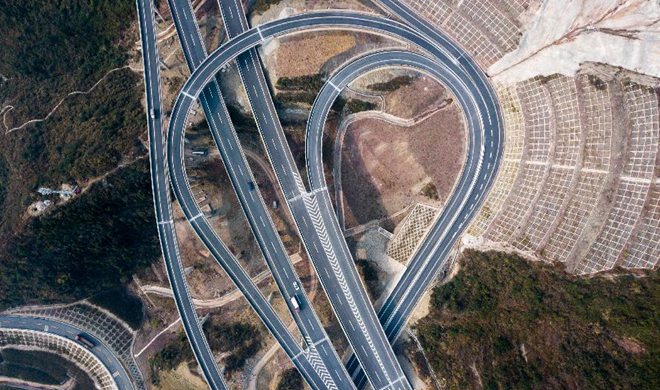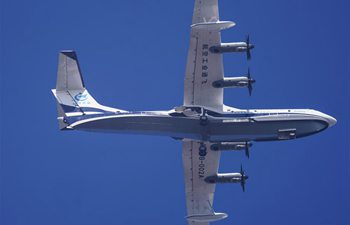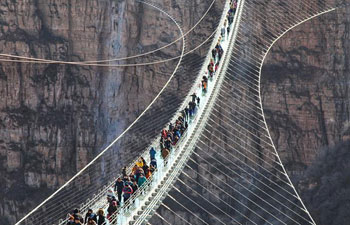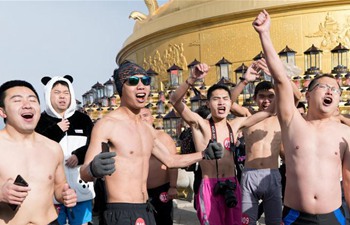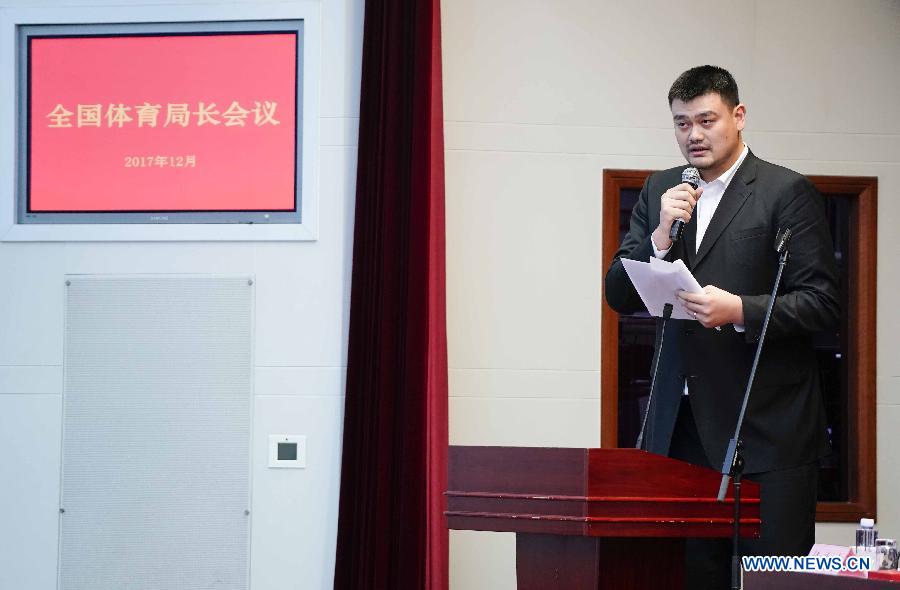
(Xinhua photo)
By Sportswriters Zheng Zhi, Wang Haoyu
BEIJING, Dec. 26 (Xinhua) -- An extraordinary triumph came on an ordinary Sunday night in Seoul, as team China beat South Korea 92-81 in the preliminaries of the 2019 FIBA World Cup.
Nearly half of the guests' starters were absent from the game including Houston Rockets' center Zhou Qi. But youngster Sun Minghui scored 21 points, three rebounds and four assists, while Abdusalam contributed 15 points, seven rebounds, three blocks and three assists to secure the victory for China.
However, only one year ago, it would have been nearly impossible for Abdusalam and Sun to wear the national team jersey.
"I thought it was fake news when they told me I am in the national team," said Abdusalam. But the dual national team system created by Yao offered them the chance to train with (and later become) China's best players.
An entirely new system has two teams led by a double-coaching system consisting of Du Feng and Li Nan playing in different international competitions before they merge into one in 2019 to prepare for the 2019 FIBA World Cup and the 2020 Tokyo Olympic Games.
And this is just one of those bold policies adopted by the newly-elected Chinese Basketball Association (CBA) president, a man who needs no introduction, Yao Ming.
Though he put on the orange Naismith Memorial Basketball Hall of Fame jacket in 2016, 2017 is an even more remarkable year for Yao. After an unanimous vote in February, he became the first-ever non-governmental personage to take the presidency of the CBA. In July, he was elected as the chairman of the board of the CBA company that owns China's top basketball league. His Hall of Fame glory, it turned out, was just a new start to his career, as Yao became the spearhead for China's basketball reform effort.
In part of a bigger reform triggered in China's sports system, professionals, like Yao Ming and Jenny Lang Ping, began to play important roles in sports associations. Take basketball as an example, where the reform saw the tasks of an administrative center of basketball, a sub-division of the State General Administration of Sports, transferred to the CBA, which means the association will take on full responsibility for governing the sport in China. When the transition is completed, the association will be responsible for the management of national teams, leagues, youth development as well as the development of basketball in society.
"This is a great step on the road to reforming Chinese basketball. Meanwhile, we must realize that we still have a long way to go," said Yao.
As for the national teams, the long road started with a small but significant change, as every potential national team member now receives an invitation letter rather than a compulsory notification. They can choose to join the team immediately or stick to a personal schedule first such as playing in the NBA summer league or getting married. This change reflects an environment where respected, allowing players like Ding Yanyuhang and Zhou Qi have a better chance to dream big. Neither Yao nor Wang Zhizhi enjoyed this kind of privilege in their career.
Just as he played in the paint for Houston, Yao was literally everywhere in the CBA. He could show up at the CBA press conference held in Beijing in the morning, talking in a meeting with China's basketball journalists in the afternoon before going to a night state banquet focused on building international cooperation. After the next day he is already sitting at a summit in Shanghai answering questions. His personal life is not the only thing Yao has given up, he also sold his share of CBA's Shanghai side, the team he played for before he went to NBA in 2002. He waived the controlling shareholder role of a single team to see the big picture of the whole CBA league.
The CBA league is by far one of the best pieces of sports IP and the biggest attraction in the market of basketball in China. After Yao took in charge, the league started a five-year plan of reform. There will be ten playoff teams instead of the previous eight, and the number will increase to 12 in 2018-2019 season. The regular season will grow from 38 rounds to 56 rounds within five years.
Yao's reform of the league also includes the design of a NBDL-like development league to provide more opportunities to young players. More fundamental work is being done like professional training of the judges, the CBA draft and fitness tests.
"Investment isn't everything in the sports industry, gold medals aren't everything for a strong sporting country," Yao said in his remarks at the annual session of the 12th National Committee of the Chinese People's Political Consultative Conference (CPPCC), China's top political advisory body.
China had already built much more than 600,000 basketball courts, showing that the country realizes that a sole focus on professional games or national teams would be not enough. Yao said that competitive sports, mass sports, the sports industry, and sports culture must all advance shoulder to shoulder.
Yao and the CBA are now promoting basketball to people of all walks of life, including children.
"Only by keeping our feet on the ground of history can we look up at the starlit sky," said Yao when he visited the first basketball stadium of China in Tianjin.
China's Basketball Hall of Fame will be built in 2019 as a testament to this sport's importance in China. Yao advised that the authorities of education and sports should join hands to build bridges for young players as this kind of cooperation will boost mass sports. One example can be seen in Fuzhou of Fujian Province, where 100 schools with basketball characteristics will be built as part of the program.
More than once, Yao has stressed the potential of 3 on 3 basketball as a way to develop this newest member of the Olympic family. He took part in a wheelchair shooting contest draw attention to basketball for people with disabilities. Meanwhile, a new plan of children's basketball designed for children under 12 was launched and the related league kicked off this December.
According to Yao, basketball is a way of life, a method to educate people and a way of strengthening society. It strengthens people in body and mind. By allowing more and more children to get involved in basketball, Yao is trying to lay a solid foundation for the sport's future in China.




